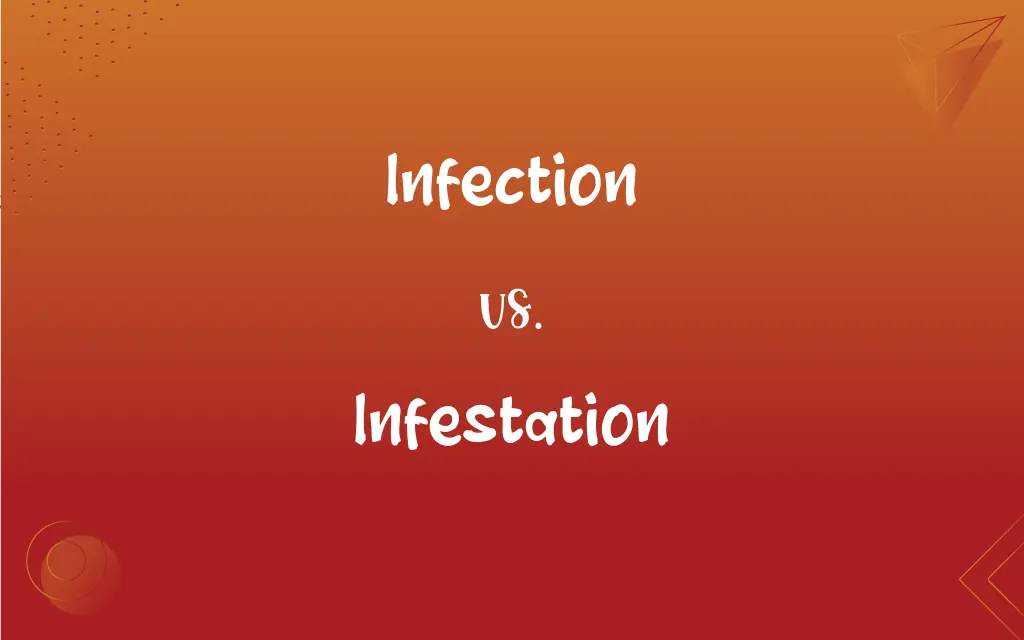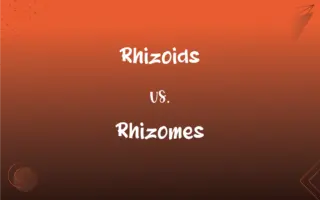Infection vs. Infestation: What's the Difference?
Edited by Janet White || By Harlon Moss || Updated on October 13, 2023
Infection refers to the invasion of organisms (bacteria, viruses) in the body, causing disease. Infestation involves harmful pests (lice, mites) living on or in a host. Both affect health but differ in causative agents and manifestation.

Key Differences
Infection denotes a condition wherein microorganisms, such as bacteria, viruses, or fungi, invade a host organism, disrupting its normal functionality. Infestation, on the other hand, is described as the presence or dwelling of larger parasitic organisms, like insects and pests, in or on a host. Both words signal an unwarranted and harmful presence, but infection leans toward microscopic invaders while infestation implies more tangible, macroscopic intruders.
Infection typically manifests through numerous signs and symptoms, such as fever, pain, and other indicators of an immune response, as the body attempts to eradicate the invasive entities. Conversely, infestation may or may not present obvious immediate symptoms and is often recognized by the noticeable activity or presence of the pests themselves. While both can yield apparent signs, infections generally correlate with more systemic responses and infestations with localized physical evidence.
Infection, in the medical realm, is more closely associated with treatment involving antimicrobial medications, such as antibiotics, antivirals, or antifungals, targeting the specific microorganisms. Infestation, however, is commonly addressed through the removal or extermination of the pests, potentially involving pesticides, physical removal methods, or environmental modifications. Thus, infection and infestation each bring about distinct intervention strategies, tailored to the particular intruders involved.
In terms of prevention, infection control often involves strategies like vaccination, hand hygiene, and avoiding contact with pathogens, focusing on minimizing the risk of microscopic invasion. Preventing infestation tends to be more about controlling the environment – managing cleanliness, using pest-repellent strategies, and avoiding areas known for harboring particular pests. Although both words signal undesirable biological interference, infection speaks to a battle on the microscopic level, while infestation battles visible pests.
Comparison Chart
Defining Agent
Microorganisms (bacteria, viruses, fungi)
Pests (lice, mites, bed bugs)
ADVERTISEMENT
Symptomatic Response
Systemic (fever, fatigue)
Localized (bites, physical signs)
Treatment Approach
Antimicrobial medications
Physical removal/pesticides
Prevention Strategy
Hygiene, Vaccination
Environmental control
Manifestation
Internal/bodywide effects
Often external/visible pests
Infection and Infestation Definitions
Infection
Infections can be categorized by the causative agent, such as bacterial, viral, or fungal.
The flu is a viral infection that affects the respiratory system.
ADVERTISEMENT
Infestation
Infestation can be external, with pests inhabiting the surface or surroundings of organisms.
The child had an external lice infestation in his hair.
Infection
Infections may be asymptomatic, where the host does not exhibit visible signs despite having pathogenic organisms.
Some individuals can carry a urinary tract infection without displaying the typical symptoms.
Infestation
Infestations can be transient, occurring temporarily or intermittently.
The transient mouse infestation was quickly dealt with by pest control.
Infection
Infection is the invasion and multiplication of pathogenic microorganisms in a host body.
The patient was diagnosed with a bacterial infection after exhibiting symptoms of fever and pain.
Infestation
Infestation refers to the undesirable presence of pests in an environment or organism.
The kitchen was closed due to a cockroach infestation.
Infection
An infection can be localized, affecting one area of the body, or systemic, spreading throughout.
The localized skin infection was successfully treated with a topical antibiotic cream.
Infestation
A severe infestation implies a heavy or widespread presence of pests, causing notable disruption or damage.
The severe termite infestation compromised the structural integrity of the house.
Infection
Secondary infection is an infection that occurs during or after treatment of another, already existing infection.
After taking antibiotics for strep throat, she developed a secondary yeast infection due to the altered bodily flora.
Infestation
An infestation can be internal when parasites live inside an organism.
The dog was treated for an internal flea infestation.
Infection
The invasion of bodily tissue by pathogenic microorganisms that proliferate, resulting in tissue injury that can progress to disease
Measures taken by the hospital to prevent infection.
Infestation
To inhabit or overrun in numbers or quantities large enough to be harmful, threatening, or obnoxious
Rats infesting the sewers.
Streets that were infested with drugs.
Infection
The entry or placement, as by injection, of a microorganism or infectious agent into a cell or tissue.
Infestation
To live as a parasite in or on
Livestock that were infested with tapeworms.
FAQs
Can infections be asymptomatic?
Yes, infections can be asymptomatic, where the host may not show noticeable symptoms.
Are all infestations harmful?
Not all infestations are harmful, but many can cause discomfort, disease, or damage to property.
What denotes an infestation?
Infestation refers to the presence of pests, such as insects or rodents, in or on a host or environment.
Are infections contagious?
Some infections, particularly those caused by viruses and bacteria, can be contagious.
What’s a common treatment for infection?
Treatments for infection often involve antimicrobial medications like antibiotics or antivirals.
Can an infestation spread to neighboring areas?
Yes, infestations can spread, particularly if the conditions are favorable for the pests.
Can infections lead to other health complications?
Yes, untreated or severe infections can lead to further health complications.
How are infestations identified?
Infestations are typically identified through physical evidence of the pests, such as sight or damage caused.
What is an infection?
An infection is an invasion and multiplication of microorganisms in a host body.
Can infestations reoccur after treatment?
Yes, infestations can reoccur, especially if preventive measures are not implemented.
How can infections be prevented?
Infections can be prevented through methods like vaccination, hand hygiene, and avoiding pathogens.
Can animals transmit infections to humans?
Yes, some infections, known as zoonoses, can be transmitted from animals to humans.
How are infections diagnosed?
Infections are often diagnosed through symptoms, laboratory tests, and medical imaging.
How is infestation typically treated?
Infestations are usually treated by eliminating the pests through means like pesticides or physical removal.
Can infections and infestations coexist?
Yes, an organism can have an infection and infestation simultaneously, though they are distinct issues.
What is a localized infestation?
A localized infestation refers to pests being concentrated in a specific area.
How can infestations be prevented?
Infestations can be prevented by managing environmental conditions and using pest repellents.
Can humans have internal infestations?
Yes, humans can have internal infestations, such as with certain parasites like tapeworms.
Can infestations cause diseases?
Yes, certain infestations, like those of ticks or mosquitoes, can transmit diseases to humans.
What is a systemic infection?
A systemic infection affects the whole body or multiple organ systems.
About Author
Written by
Harlon MossHarlon is a seasoned quality moderator and accomplished content writer for Difference Wiki. An alumnus of the prestigious University of California, he earned his degree in Computer Science. Leveraging his academic background, Harlon brings a meticulous and informed perspective to his work, ensuring content accuracy and excellence.
Edited by
Janet WhiteJanet White has been an esteemed writer and blogger for Difference Wiki. Holding a Master's degree in Science and Medical Journalism from the prestigious Boston University, she has consistently demonstrated her expertise and passion for her field. When she's not immersed in her work, Janet relishes her time exercising, delving into a good book, and cherishing moments with friends and family.
































































